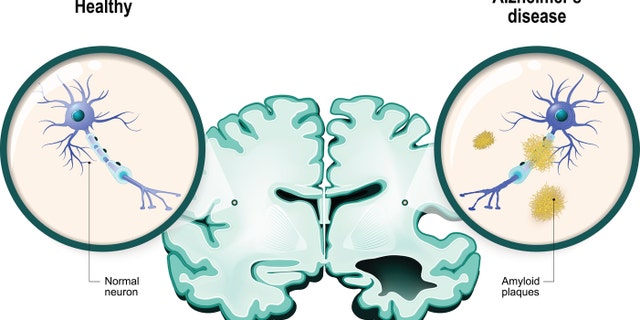
Sleep difficulties are a common complaint among those living with Alzheimer’s disease — and experts say those challenges often start well before the diagnosis.
In a recent study published in Annals of Neurology, researchers at Washington University School of Medicine in St. Louis, Missouri, evaluated how taking sleep medication could impact the brains of people with Alzheimer’s.
Participants who took a sleeping pill called suvorexant before going to bed showed a reduction in the levels of Alzheimer’s proteins in their spinal fluid. Suvorexant is an FDA-approved medication sold under the brand name Belsomra to treat insomnia.
ALZHEIMER’S DIAGNOSES EXPECTED TO REACH NEARLY 13 MILLION BY 2050, SAYS NEW REPORT
People with Alzheimer’s disease are known to experience sleep disturbances, doctors say — but it’s not so clear which one causes the other.
“Poor sleep can increase the risk of Alzheimer’s, and it can also be a symptom of early Alzheimer’s,” said Dr. Raymond J. Tesi, CEO and CMO of INmune Bio, a clinical-stage biotechnology company in Boston, Massachusetts, which develops immune-based treatments to fight Alzheimer’s disease.
Dr. Tesi was not involved in the Washington University study.

Sleep difficulties are a common complaint among those living with Alzheimer’s disease — and experts say those challenges often start well before the diagnosis. (iStock)
“Patients with the disease often have poor sleep patterns, so it is feasible to say that sleep is related to Alzheimer’s, though it’s unclear which comes first,” he continued.
“The question is whether Alzheimer’s causes poor sleep or whether poor sleep causes Alzheimer’s.”
Proteins increase with progression of disease
Alzheimer’s disease is the most common form of dementia. It begins when substances called “plaques” and “tangles” begin to form in the brain.
Plaques are “deposits of a protein fragment called beta-amyloid that build up in the spaces between nerve cells,” according to the Alzheimer’s Association website.
“People experiencing poor sleep should speak to their health care provider before taking any medications.”
Years after the amyloids start forming, another type of protein called tau starts to accumulate, creating tangles that block nutrients and other essential supplies from moving though brain cells. The formation of tangles usually occurs around the time that cognitive symptoms begin.
Both types of proteins increase as the disease progresses — and previous studies have shown that they are at higher levels in people who have poor sleep.
Early results are promising
Washington University’s two-night sleep study included 38 participants between ages 45 and 65 who had no known cognitive impairments and no evidence of Alzheimer’s-related changes in the brain.
The participants were divided into three groups. One group took a lower dose of suvorexant, one took a higher dose and one took a placebo before going to sleep.

Washington University’s two-night sleep study included 38 participants between ages 45 and 65 who had no known cognitive impairments. (iStock)
During a 36-hour period, researchers analyzed spinal fluid every two hours to measure the levels of Alzheimer’s proteins.
Those who had taken the higher dose of sleeping medication had anywhere from 10% to 20% less protein compared to those who received the placebo.
Those who took the lower dose did not show a significant difference in protein levels.
“Poor sleep can increase the risk of Alzheimer’s, and can also be a symptom of early Alzheimer’s.”
The protein levels decreased again when a second dose was administered the following night.
“This suggests that taking suvorexant over long periods of time could reduce these proteins and prevent or delay the onset of Alzheimer’s disease symptoms,” lead researcher Dr. Brendan Lucey, an associate professor of neurology and director of Washington University’s Sleep Medicine Center in Saint Louis, told Fox News Digital in an email.
EARLY ALZHEIMER’S DISEASE COULD BE DIAGNOSED THROUGH EYE EXAMS, NEW STUDY SUGGESTS
“However, additional studies are needed where participants receive drugs like suvorexant for longer periods of time — months, for instance — and we track if amyloid-beta and phosphorylated tau are decreased,” he added.
The findings are consistent with previous work that has shown poor sleep is linked to higher levels of amyloid and tau in the brain, noted Dr. Percy Griffin, the Chicago, Illinois-based director of scientific engagement at the Alzheimer’s Association.

Alzheimer’s disease, the most common form of dementia, begins when substances called “plaques” and “tangles” begin to form in the brain. (iStock)
“What is exciting here is that a short intervention of only two nights can impact those markers,” he told Fox News Digital.
“Alzheimer’s and sleep have a bidirectional relationship where poor sleep may lead to Alzheimer’s-related changes and these changes in turn disrupt sleep further,” he continued. “
This work demonstrates that it is possible to intervene in this relationship and directly impact the brain changes that lead to Alzheimer’s disease.”
Further questions remain
Beyond marking a decrease in Alzheimer’s proteins, there remains the question of whether that will result in improved cognition, said Dr. Tesi.
“The gold standard for Alzheimer’s treatment is stopping cognitive decline,” he told Fox News Digital. “Even if we don’t understand the exact mechanism of how sleeping pills affect Alzheimer’s, if the use of sleeping pills safely decreases the rate of cognitive decline, it is a big deal. Unfortunately, this study does not answer this question.”
“The gold standard for Alzheimer’s treatment is stopping cognitive decline.”
Additionally, the daily use of sleeping pills can come with side effects, the doctor noted.
“The ‘hangover’ effects of sleeping medications are real and magnified in the age group that has Alzheimer’s,” he said.
Larger studies to follow
This preliminary study looked at only a small group of healthy, middle-aged participants over a very short period of time.
Dr. Lucey, the lead researcher, is planning longer-term studies to investigate whether sleep medication can reduce signs of early Alzheimer’s in older adults.

The study author recommends that people experiencing poor sleep should speak to their health care provider. (iStock)
“Future studies need to give drugs like suvorexant for longer periods of time, include a larger number of participants and include participants with biomarker evidence of changes in the brain from Alzheimer’s disease, such as amyloid deposition,” Dr. Lucey told Fox News Digital.
MEDITERRANEAN, MIND DIETS SHOWN TO REDUCE SIGNS OF ALZHEIMER’S IN THE BRAIN, STUDY FINDS
If the larger studies confirm the preliminary findings, Dr. Lucey said he hopes to “move forward rapidly with phase III trials testing if this class of drug can prevent or delay Alzheimer’s disease — especially since suvorexant (and other dual orexin receptor antagonists) is already FDA-approved for the treatment of insomnia.”
Quality sleep is critical for Alzheimer’s patients
Although he sees the initial results as “very encouraging,” Dr. Lucey does not yet recommend taking nightly sleep medication as an Alzheimer’s prevention measure.
CLICK HERE TO SIGN UP FOR OUR HEALTH NEWSLETTER
“This study does not support taking suvorexant to prevent or delay Alzheimer’s disease,” he told Fox News Digital.
“I recommend that individuals who have unrefreshing or nonrestorative sleep should see their doctor and be evaluated for sleep disorders such as sleep apnea and insomnia.”
CLICK HERE TO GET THE FOX NEWS APP
“Treatment of sleep disorders can improve quality of life (due to decreased daytime sleepiness) and improve health,” he added.
Dr. Griffin from the Alzheimer’s Association agrees: “People experiencing poor sleep should speak to their health care provider before taking any medications.”

 Latest Breaking News Online News Portal
Latest Breaking News Online News Portal




